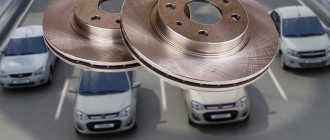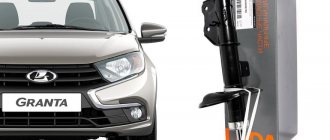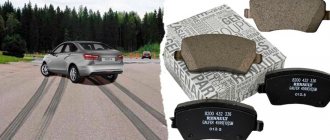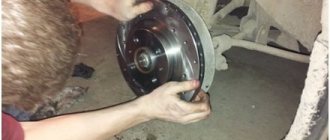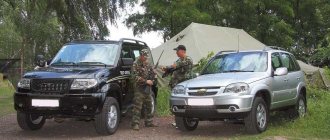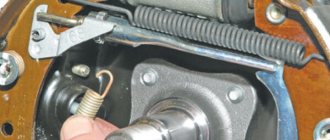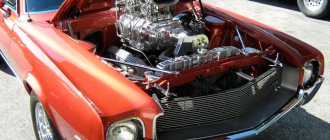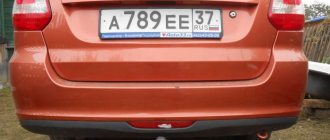When planning to buy an inexpensive car, quite often the list of priority models includes cars such as Renault Logan and Lada Granta.
Renault Logan and Lada Granta
One car is from a Russian manufacturer, the second is from a French car manufacturer. Both cars do not have supernatural characteristics or any unique capabilities. But these are budget class cars that fully correspond to this segment and can offer more than a number of competitors.
In order to draw certain conclusions and come to certain results, you need to compare two cars according to different criteria and characteristics. This is the only way to choose a priority option between Lada Granta or Renault Logan.
Main technical characteristics
The premiere of the three-volume Lada Granta car took place in Moscow in the summer of 2011. Assembly began in October of the same year. In fact, Granta became a replacement for three outdated models of the AvtoVAZ line, including 2107, Samara and Kalina. It was on the basis of Kalina that Granta was created, although the latter eventually received over 400 original components.
In 2014, the model underwent a planned facelift, which largely affected the front part of the model. And in August last year, the premiere of a significantly updated version took place.
Overall dimensions allow Granta to be classified as a subcompact model, based on the European classification. This is confirmed by the corresponding overall dimensions:
- length 4260 mm;
- width 1700 mm;
- height 1500 mm;
- wheelbase 2476 mm;
- ground clearance or ground clearance 160 mm;
- curb weight from 1075 kg.
For Russian consumers, Granta is offered with 3 naturally aspirated engines. But we will talk about them a little later.
Lada Granta is built on a front-wheel drive architecture, where the engine is located transversely. In front there is a McPherson spring independent suspension, complemented by an anti-roll bar. At the rear there is a semi-independent spring-lever type suspension.
To compare Renault Logan cars and the domestic Lada Granta model, sedan cars in their current appearance, that is, after restyling, will be taken as a basis.
The Renault Logan belongs to the European B-class and has a front-wheel drive platform. The machine is aimed at a wide range of consumers, due to its minimum cost and maximum capabilities. This is exactly how the French developers describe their creation.
The second generation debuted first under the name Dacia Logan, and began production with the Renault logo in 2013. The new product appeared in Russia in 2014. From July 2022, we have a restyled version available, which is what is being considered in this comparison between two popular representatives of the budget class.
If we talk about overall characteristics, then Logan has the following figures:
- length 4346 mm;
- width 1733 mm;
- height 1517 mm;
- wheelbase 2634 mm;
- ground clearance 155 mm;
- curb weight 1106-1156 kg.
The Frenchman surpasses its more compact rival in this component, although it also belongs to the subcompact car segment.
Renault Logan is built on the basis of the M0 front-wheel drive architecture, where the engine is mounted transversely. Moreover, in the second generation, a large amount of high-strength steel was used for the body. There is an independent McPherson suspension at the front, and a semi-independent beam at the rear, complemented by hydraulic shock absorbers. Anti-roll bars are available front and rear.
Lada Granta
It was announced in 2011. It was positioned as a more budget version of Kalina, built on its basis. But in the end, only Granta remained. Production is established in Tolyatti.
Types of engines:
- 1.6 l. (87 hp) - from 435,000 rub.
- 1.6 l. (98 hp) - from 596,500 rub.
- 1.6 l. (106 hp) - from 531,500 rubles.
Exterior
Although many argue that appearance is not the main thing, when choosing a car it is difficult to agree with such a position. First, a potential buyer looks at the appearance. If you like the car, the further process of studying all the features, characteristics and other parameters of the model is already underway.
Therefore, when comparing two cars, when determining which is better to choose - Lada Granta or Renault Logan, the exterior will play an important role.
The restyling of the four-door sedan in the form of the Lada Granta clearly benefited the car. The signature X-design from the Tolyatti automobile plant allowed the model to get an original front end. As a result, the car began to look much more modern, more interesting and attractive. The proportions are precisely adjusted, there is no imbalance observed. The car definitely does not cause any discomfort or irritation.
Granta looks best from the front, which is due to the use of X-style. The car boasts a slanted front optics, a large logo, and a chrome boomerang that covers a solid bumper and allows you to visually connect the radiator and false radiator grille. But if you look at Granta from other sides, there will be no such emotions. The simplest side parts, a not particularly expressive rear bumper, a shaped trunk lid, a lot of stampings and a bloated bumper. It seems good, but nothing special.
The Granta's exterior is still more aimed at a young audience than its opponent, Renault Logan. The Frenchman was mercilessly criticized for the appearance of the first generation. After the generation change, the situation changed for the better, but there were still many reasons for criticism.
If we compare the new Logan with its predecessor, the new product has become prettier, more modern and more proportional. Gone are these simple forms and uncomplicated solutions. From the front, the car looks quite interesting, has beautiful and large optics, a stylish false radiator grille, and a literally huge Renault logo.
Looking at the Renault in profile, you will see the classic image of a three-volume car. The roofline is almost perfectly straight, the wheel arches are swollen, and the C-pillar is powerful. The extension in the form of a trunk still looks harmonious.
There is no need to say that Granta is clearly prettier than Logan. Both cars tried to create a modern and more age-appropriate look, but they succeeded by about 50%.
But you can’t judge cars by their appearance alone. It is imperative to look at other parameters and touch upon technical specifications.
Interior
It is impossible to give high marks for the interior decoration of Logan and Granta. The Russian sedan widely used hard and cheap plastic, complemented by silver decor. But this does not help the situation.
Salon Lada Granta
If you look at the Lada Granta passport, you can see a 5-seater layout. But this is only on paper. In fact, a comfortable position on the rear sofa is available only for 2 people. Moreover, tall and large people will not be particularly comfortable here, since there is a lack of space in the knees and above the head. At the same time, the sofa was made very comfortable and with the correct anatomical shape.
The front seats have decent lateral support and a wide range of adjustments, if you take the top-end configuration.
But the Granta’s trunk failed to even surpass the luggage compartment of today’s competitor in its performance, since not every automaker is ready to offer 480 liters in a subcompact. Moreover, the rear sofa can be folded and you get an almost perfectly flat floor.
Salon Renault Logan
Renault Logan looks more interesting inside than outside. More modern interior solutions, stylish components, and a pretty good multi-function steering wheel are used here. Ergonomics are at a decent level, everything is arranged as it should be. I don't want to move or displace anything. The center console is designed in a minimalist style, but it can accommodate a large 7-inch multimedia touch display.
Logan's finishing materials are not significantly more expensive than Granta, but they are of better quality and more pleasant to the touch. The front seats received pronounced lateral support and excellent lumbar support. There is also a wide range of adjustments, plus heating. The second row has enough space for 3 adult passengers. But the sofa is flat, its level of comfort is noticeably inferior to the sofa on Granta.
The luggage compartment of the French sedan is designed for 510 liters. Moreover, here, like the Granta, there is a full-size spare tire in the underground.
Let's look at the shortcomings of Grant and Logan
LADA Granta car owners highlight the following shortcomings in their cars:
- When equipped with an automatic transmission, the car is not equipped with a heated windshield;
- Brakes squeak;
- It's hard to close the rear doors;
- Loud noise in the cabin;
- When the air conditioner is operating, a rumble is heard;
- Frequent absence of parts from the warehouses of official representatives and long delivery times;
- The need to tighten all bolts and nuts after purchase.
Although Logan does not have such a list of shortcomings, there are still shortcomings such as oil leakage from the engine, power steering and gearbox, but they are reflected in the operation of the car.
Security Settings
Let us remind you that for comparison we present the new or, more accurately, updated Lada Granta, as well as the second generation Renault Logan. The results of safety tests of previous generations and pre-restyling versions are not taken into account.
Renault Logan has several configuration options, but each of them offers a wide list of systems and components that affect active and passive safety. If you want the maximum set, then you need to take the top versions.
Logan cars are equipped with high-quality front and side airbags, three-point seat belts in the front, and a body made of high-strength steel. All this allows you to get a budget, but very safe car, perfect for Russian consumers.
Lada Granta does not have the same high-quality body, which is why it is inferior to its competitor. A certain disadvantage is the fact that the Lada Granta, like other domestic models, does not pass crash tests of the European and international standard, which are Euro NCAP. Because of this, it is difficult to objectively compare the two cars based on these parameters.
Let's be honest, domestic cars have always lagged behind their main competitors in terms of safety indicators. There have been no significant changes or improvements in the case of Granta. Even after restyling. But that doesn't mean it's a completely unusable car. No, it has airbags, a strong frame, collision resistance, various electronic systems, and so on.
Cost of maintaining Logan and Granta cars
Vehicle maintenance costs are on average the same.
The first technical inspection for Logan must be completed after 15,000 km, its cost will be up to 9,000 rubles. As for Grant, the first inspection will need to be completed at around 2000-3000 km, however, it is free for more powerful engines and will cost 1,500 rubles for younger engines. You will also have to undergo maintenance at around 15,000 km and its cost, as for Logan, will not exceed 9,000 rubles.
Car insurance costs are also approximately equal and cost from 25,000 rubles for Grant and from 32,000 for Logan, if the engine is less than 100 hp. With a larger displacement, you will need to pay about 36,000 rubles for a domestic car, and 46,000 for a foreign car. But in the case of Logan, when buying on credit, the manufacturer offers a cheaper option - CASCO costing up to 13,000 rubles.
“Reasonable CASCO” offers full compensation for the cost of a car in the event of its theft or an accident after which restoration of the car is impossible. And also, if the car is damaged, a fixed amount is allocated for repairs - 35,000 rubles. In the event of an accident due to the driver's fault, once every 12 months you are given the opportunity to have the car repaired at an official technical center.
Fuel consumption for Grant and Logan in the first 15,000 km is almost the same and amounts to 7.2 - 7.3 liters per 100 km.
Available motors
One of the most important criteria when choosing a car is the engine in combination with the gearbox. Moreover, in the case of budget cars, buyers primarily do not look at maximum power. They are much more interested in reliability, efficiency and good dynamics.
Quite an interesting point on which you can compare Renault Logan and Lada Granta.
Lada Granta engine
Let's start with the Russian representative. There are 3 naturally aspirated engines with 4 cylinders available. Moreover, each engine is in-line and has a volume of 1.6 liters.
- The basic one is an 8-valve power unit with 87 horsepower and 140 Nm of torque.
- The middle one in the hierarchy is a 16-valve engine with 98 horses and a torque of 145 Nm.
- The top one is a 16-valve engine with 106 horsepower and 148 Nm of torque.
By default, Lada Granta is equipped with a standard front-wheel drive transmission and a manual gearbox. For the 98 horsepower engine there is a non-alternative 4-speed automatic transmission. If we take the Granta with the most powerful engine, then the buyer gets the right to choose between a manual transmission and a 5-speed robot.
Depending on the configuration, the car can accelerate from 0 to 100 kilometers per hour in 10.5-12.4 seconds. The maximum speed varies from 167 to 183 kilometers per hour.
In the combined cycle, Granta consumes from 6.6 to 7.6 liters of fuel for every 100 kilometers traveled.
Now I wonder how the French public sector Renault Logan will be able to respond to this.
Engine Renault Logan
There are 3 engines available for Renault Logan in Russia. The interesting thing here is that they are all four-cylinder and, as in the case of the Granta, have the same volume of 1.6 liters.
- The standard and youngest engine is an 8-valve engine with a power of 82 horsepower and a torque of 134 Nm.
- Next in the hierarchy is a 16-valve unit with 102 horsepower and 145 Nm of torque.
- The top model for the Renault Logan is considered to be a 16-valve internal combustion engine with 113 horsepower, and the torque here is 152 Nm.
The base and top-end engines come standard with a 5-speed manual transmission. But for the middle engine there is an automatic four-speed gearbox. The problem is that there is no alternative.
Renault Logan can accelerate from 0 to 100 kilometers per hour in 13.9-10.7 seconds. The maximum speed, depending on the engine, will be from 163 to 177 kilometers per hour.
In terms of efficiency, the indicators are not ideal, but still not bad. For 100 kilometers, if we take a mixed cycle, the car will require from 8.4 to 6.6 liters of fuel. The fuel in both cases is AI-95 gasoline.
Acceleration, dynamics and top speed are a little on the side of the Lada Granta. The consumption is approximately the same, so it is impossible to determine a clear favorite here.
About the engine
Lada Granta
The new model still has one 8-valve engine with an output of 87 hp. and two 16-valve 98 hp. and 106 hp From the gearbox you can choose: the old, good and sometimes howling - 5-speed manual transmission, or a robot with one clutch, or a 4-speed Jacto hydromechanics.
Renault Logan
Stability awaits us here. Eight-valve 82 horsepower and two sixteen-valve engines with 102 hp. and 113 hp All engines have a volume of 1.6 liters. There are only two transmission variations: either a 5-speed manual transmission or a 4-speed automatic transmission
Behavior on the road
Many motorists demand a smooth ride from their car under any road conditions. This directly depends on the parameters and design features of the chassis. As a result, having received certain characteristics, you can judge the car by how it behaves on the roads.
Understanding the high level of importance of a high-quality and efficient chassis, it is necessary to compare the two cars in question using this parameter. It’s worth taking a look at what Renault Logan is ready to offer, and what kind of response Lada Granta has prepared.
The design of the suspension and steering allows the Granta to behave confidently and steadily during a sharp increase in speed. This was confirmed by various experts as part of the tests carried out. If you keep the speed at 2500-3000 per minute, the car will behave stably and predictably. This is an important indicator for those who often drive in city traffic jams and are forced to quickly respond to changing traffic situations.
Braking is also more on the side of the Granta, since the braking system has decent information content. When the driver presses the brake pedal, the reaction is immediate. In the emergency braking tests, the Lada Granta won by a small margin.
As for the Renault Logan, stability during acceleration is also at a good level, as is the responsiveness of the brakes. But the suspension can be safely called softer. In some places this is good when it comes to comfort, but soft suspensions also have their drawbacks.
What to expect from a car on the secondary market
We checked 15 cars of each model through the Autocode service and found out what “skeletons in the closet” popular budget models have:
In the Autocode database there were several cars that work as taxis. Here is one of them:
The car has a whole bunch of troubles: accidents, use in a taxi, unpaid fines... In addition, changes have been made to the design of the vehicle. The car was probably used for training in a driving school. You can recognize this by the additional pedals on the front passenger side.
By the way, the license to operate a taxi was revoked, but for some time the car was involved in private transportation:
But even without working in a taxi, the presence of several accidents in a car will probably scare off a potential buyer. Like this “Nexia”:
Two insurance company calculations point to previous accidents. There are also unpaid fines.
And here is an example of “Grants”:
Not only was the car used as a taxi, it also had 2 accidents.
Analysis of the reports showed that Granta is cleaner.
Also read: Rare Ladas on the secondary market
Maintenance and repair
Someone will say that since the Lada Granta is a Russian car, it will be much cheaper and easier to maintain than a car of a foreign brand.
And this is a fairly common misconception. Both cars are, by definition, budget-friendly, and there is no talk of any expensive maintenance here. For AvtoVAZ, one of the key aspects of successful sales was to provide customers with an appropriate level of service, availability of spare parts and the ability to carry out repairs themselves.
Although not perfect, the enterprise coped with its tasks. Spare parts for Granta are very easy to find; they are quite cheap compared to many competitors, but not Renault Logan. Carrying out independent repairs will also not be difficult when you have at least minimal experience and some basic knowledge.
But all this applies to domestic cars. It would be strange to produce Russian cars in Russia for which expensive spare parts or unavailable components are offered.
Despite its French roots, Renault Logan also managed to become a people's car in Russia. It is highly valued and loved because the car is as reliable and trouble-free as possible. Granta is still inferior in this component, since the car from the factory has a number of defects that appear a short time after the start of operation. Logan is also not perfect, but it looks preferable to its competitor.
Although such a comparison initially gives a certain advantage to the Lada Granta, even here the Renault Logan managed to show its best side. For Logan, spare parts are also cheap, the car easily accepts non-original parts, and can work with not the highest quality consumables. Draw your own conclusions about which car is better and more profitable to buy for use in Russia.
Repair
There are about 400 Lada service centers in Russia and they are located in all regions of Russia, while Renauln technical centers are less than 200 in 110 cities. And spare parts for domestic cars are several times lower. For example, replacing front pads with Logan will cost up to 5,000 rubles. While the price for the same pads on Granta is only 500 rubles. The situation is the same with timing belts; for a Logan it costs up to 15,000 rubles, and for a Grant – up to 1000. And the same situation applies to all spare parts.
Granta has an undeniable advantage here.
Options and prices
The battle between Lada Granta and Renault Logan is coming to its logical conclusion. But an important comparison factor is still the equipment.
Let's start with the French sedan. For Russian consumers in 2019, there are 4 trim levels, ranging from Access to Style. For the simplest of them with an 82-horsepower engine you will have to pay from 550 thousand rubles. The set of equipment is not ideal, so it is better to immediately take at least the Life package, which is second in the hierarchy. But it will cost from 610 thousand rubles. The top version costs approximately 740 thousand.
In terms of price, the Lada Granta wins, since from the start the car costs from 430 thousand rubles. For this money you can get GLONASS, an airbag for the driver, audio preparation, 13-inch steel wheels, ABS, EBD, BAS and other components. At the same time, the basic equipment of Granta turned out to be poorer and worse than that of its French opponent.
It is worth taking a Granta in basic equipment only in exceptional cases and desperate situations. It is much more correct to collect a little more money, but buy a medium, or better yet, top version. But some car enthusiasts, having carefully studied this comparative analysis of the two cars, will advise saving money and getting a Renault Logan.
Prices
On the secondary market, the average price of “Grants” is about 302 thousand rubles.
The cost depends on the condition of the car, mileage and configuration. A five-year-old car is sold for 250 thousand rubles:
“Logan” of the same year 2014 will cost a little more - 350-400 thousand rubles:
On average, the price tag for Avto.ru for Logan is the same as for Granta - 301,913 rubles.
The cheapest one is Nexia . The average cost of a car is about 139 thousand rubles.
A car from the same 2014 can be bought for 220-300 thousand rubles:
Let's sum it up
Now we can say a few final words regarding what to choose when the Renault Logan and Lada Granta cars are standing in front of you.
Logan has been present on the Russian market for more than 10 years. This is a decent amount of time for consumers to note all the strengths and weaknesses of the car. But this is objectively not enough to decide what to buy for yourself - Logan or Granta. After all, the same conclusions are needed regarding the Russian opponent. And then it will become clearer whether to buy a Frenchman or support the domestic auto industry.
If you need a work car for a reliable and comfortable ride, it is better to give preference to the Renault Logan. When you properly care for it and operate it correctly, major repairs will be required at least after 300 thousand kilometers. There are examples when Logan passed all 500 thousand. Yes, conclusions are drawn largely based on the history of the first generation. But the second generation retained the main strong qualities of its predecessor, plus in some places it became better.
Renault Logan does not use complex designs, multi-level schemes or additional expensive parts. All this has a positive effect on the service life of the machine. Even if something in Logan breaks, it will be quite cheap to restore, repair or replace it.
Currently, Logan is considered the most reliable car in the budget segment. Therefore, many people do not even have doubts about what is better to buy - Logan, Granta or some other car. In their understanding, you cannot buy anything better for that kind of money than the French model. Logan is cheap, but built to last. Yes, there are minor assembly flaws, but this does not spoil the overall impression of the car.
In defense of the Lada Granta, we can say that for the Russian auto industry it is a kind of breakthrough, an exit to a higher quality level. The demand for the model is largely due to its affordable price, which is lower than that of its competitor. Plus, there is a solid luggage compartment, a good level of comfort in the interior and a nice design. Consumer expectations regarding accessible service were confirmed.
It’s not for nothing that Granta is actively used as a first car for beginners, purchased for taxi services and used as a car for work, trips to the country, fishing, etc. Reliability and comfort are at a decent level, and fuel consumption is also low.
What's good and what's bad
“Granta” has been present on the secondary market for a long time, which means that car owners have a clear list of reasons why they can love this car. This:
- indestructible suspension;
- trunk capacity of 520 liters;
- warm stove;
- cheap and accessible spare parts;
- Fuel consumption is about 7 liters per “hundred” for a manual transmission and an 87 liter engine. With.;
- high ground clearance;
- reliable Japanese automatic transmission.
It is quite expected that Logan has something to brag about. First, let's note the positive experience of car enthusiasts:
- Car breakdowns are rare;
- indestructible chassis;
- economical engines: for 1.6 liters - about 9 liters per 100 km;
- sells well on the secondary market;
- cheap and accessible spare parts;
- maintainability and availability of repairs in any service.
Daewoo Nexia have a set of advantages like Logan. Let's understand the advantages:
- Reliability. The car rarely breaks down.
- Good engines. They do not require major repairs or other technical interventions for a long time.
- Cheap spare parts available in stores.
- The soft suspension handles bumps and holes well.
- Ergonomic interior. Everything is in its place.
As for the minuses , all three models have poor sound insulation. The cabin is noisy both in urban environments and on the highway. Cheap interior materials look unattractive, feel hard to the touch, and can make squeaking sounds when connected to each other or to metal. Also, everyone has bad paintwork. Chips quickly appear on the bumpers and hood. And then there are pockets of corrosion on the metal.
The models also have individual complaints. Grants of reverse gear on manual transmissions. Repairs, although cheap, require time from the driver.
Logan has weak engines, even the most powerful 1.6-liter . There is not enough traction when overtaking. And the noisy operation of the manual transmission only worsens the situation with the already weak sound insulation of the cabin. From - frequent breakdowns of ball joints.
Nexia has the longest list of shortcomings. Among them:
- Inconvenient entry into the car. The seats are low.
- Cold interior in winter. A standard stove is not enough for heating. And poor thermal insulation quickly cools the interior when the engine is not running.
- Weak electrical wiring will rot from moisture over time, and breaks may occur in some places.
- The small ground clearance does not allow comfortable parking near curbs.
- Increased fuel consumption.
As you can see, the models have a number of their own “sores”, but all three have overall reliability. What else do you need in the budget price segment?
Also read: All Russian cars are bad: truth or stereotype

